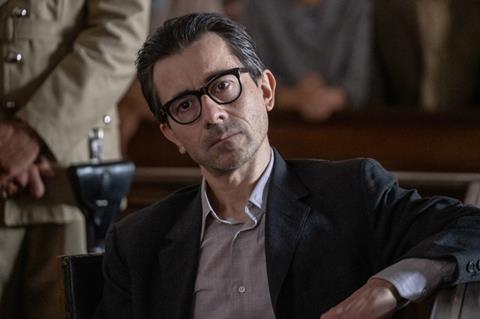Gianna Amelio’s dramatisation of a strange 1960s Italian trial may prove somewhat lost in translation

Dir: Gianni Amelio. Italy. 2022. 134mins.
Italy was a strange and contradictory place in the 1960s. At the same time that students and factory workers were pushing back against the system, and new currents of cultural and sexual freedom were being showcased in films like Blow-Up, Aldo Braibanti, a gay Marxist writer and artist, was tried and sent to prison for a crime which had been put on the statute books in the Fascist era: imposing his personality and ideas on an impressionable subject, in this case a young male friend.
Strong performances may not be enough to overcome audiences’ lack of familiarity with the Braibanti case
The ‘Caso Braibanti’, as it was known, created a scandal at the time and made headlines around the world, but has become something of a footnote in Italian post-war history. Veteran director Gianni Amelio, however, proves that it’s worth resurrecting in this baggy but earnest issue film. If Amelio’s drama – which is also in a way a love story – rises above the air of conventionality that adheres to its every over-stylised tracking shot, it’s not just because of its passionate exposure of a historical injustice. It’s because of the warning it contains for a contemporary Italy in which the forces of reaction are on the move once more. That resonance, and the media coverage it will generate, should provide something of a return to Italian box-office form for Amelio when the film is released on September 8, soon after its Venice Competition premiere.
Elsewhere, however, strong performances by two of Italy’s most bankable male actors, Luigi Lo Cascio and Elio Germano, may not be enough to overcome audiences’ lack of familiarity with the Braibanti case. One of the problems is the fact that the crime of ‘plagio’ itself, which existed nowhere else in the world (and was declared unconstitutional in 1981) gets lost in translation. In today’s Italy, as elsewhere, it is usually applied to literary or artistic plagiarism. But it also has an archaic sense derived from its Latin meaning – ‘kidnapping’. This is what Braibanti was accused of by the father of a student who became his lover; kidnapping his son’s mind and soul, and by extension his body.
As played by Lo Cascio, Braibanti is a difficult, reserved left-wing poet, artist and avant-garde theatre director, who we see, in the flashback scenes that take up most of the film’s first half, presiding over an artistic collective in the flat agricultural landscape of his native Po Valley. He seems at his ease only when studying the ant colonies he keeps in glass formicariums – or when encouraging the artistic ambitions of sensitive teenager Ettore, played convincingly by newcomer Leonardo Maltese, soon also to be seen in Marco Bellocchio’s upcoming feature The Conversion. Ettore comes from a deeply Catholic and conservative family which considers both Communism and homosexuality to be curable diseases.
What is shocking, once we fast forward several years to a classic courtroom scene, is that many in the Italian establishment, on both sides of the political fence, seemed to agree – at least about the homosexuality. Amelio and his co-writers use the invented figure played by Germano – a lowly reporter on Italian Communist Party daily ’L’Unità’ who is assigned a story his editor is clearly uncomfortable with – to convey the hypocrisy even of much of Italy’s liberal establishment. Not much is made here of those mavericks who did leap to Braibanti’s defence at the time, including Pasolini, Umberto Eco and Bellocchio, who gets an executive producer credit on the film.
With its sombre orchestral music by go-to Italian film score composer Nicola Piovani and its old school Cinecittà craft values, Lord Of The Ants is at its best when it sticks most closely to the facts. Ettore – whose real name was Giovanni – really was confined to an asylum and given corrective electro-shock therapy after his family had him bundled into a car in Rome, where he was living with Braibanti. On release, he really was forbidden to read books that were “less than a hundred years old”. And despite all this, he really did testify in his ‘kidnapper’s’ favour during a trial that was one of the blackest chapters of post-war Italian legal history.
Production companies: Kavac, IBC Movies, Tenderstories, Rai Cinema
International sales: The Match Factory, sales@matchfactory.de
Producers: Simone Gattoni, Beppe Caschetto
Screenplay: Gianni Amelio, Edoardo Petti, Federico Fava
Production design: Marta Maffucci
Editing: Simona Paggi
Cinematography: Luan Amelio Ulkaj
Music: Nicola Piovani
Main cast: Luigi Lo Cascio, Elio Germano, Leonardo Maltese, Sara Serraiocco






![The Brightest SunScreen[Courtesy HKIFF]](https://d1nslcd7m2225b.cloudfront.net/Pictures/274x183/3/5/0/1448350_thebrightestsunscreencourtesyhkiff_312678.jpg)















![The Brightest SunScreen[Courtesy HKIFF]](https://d1nslcd7m2225b.cloudfront.net/Pictures/100x67/3/5/0/1448350_thebrightestsunscreencourtesyhkiff_312678.jpg)

